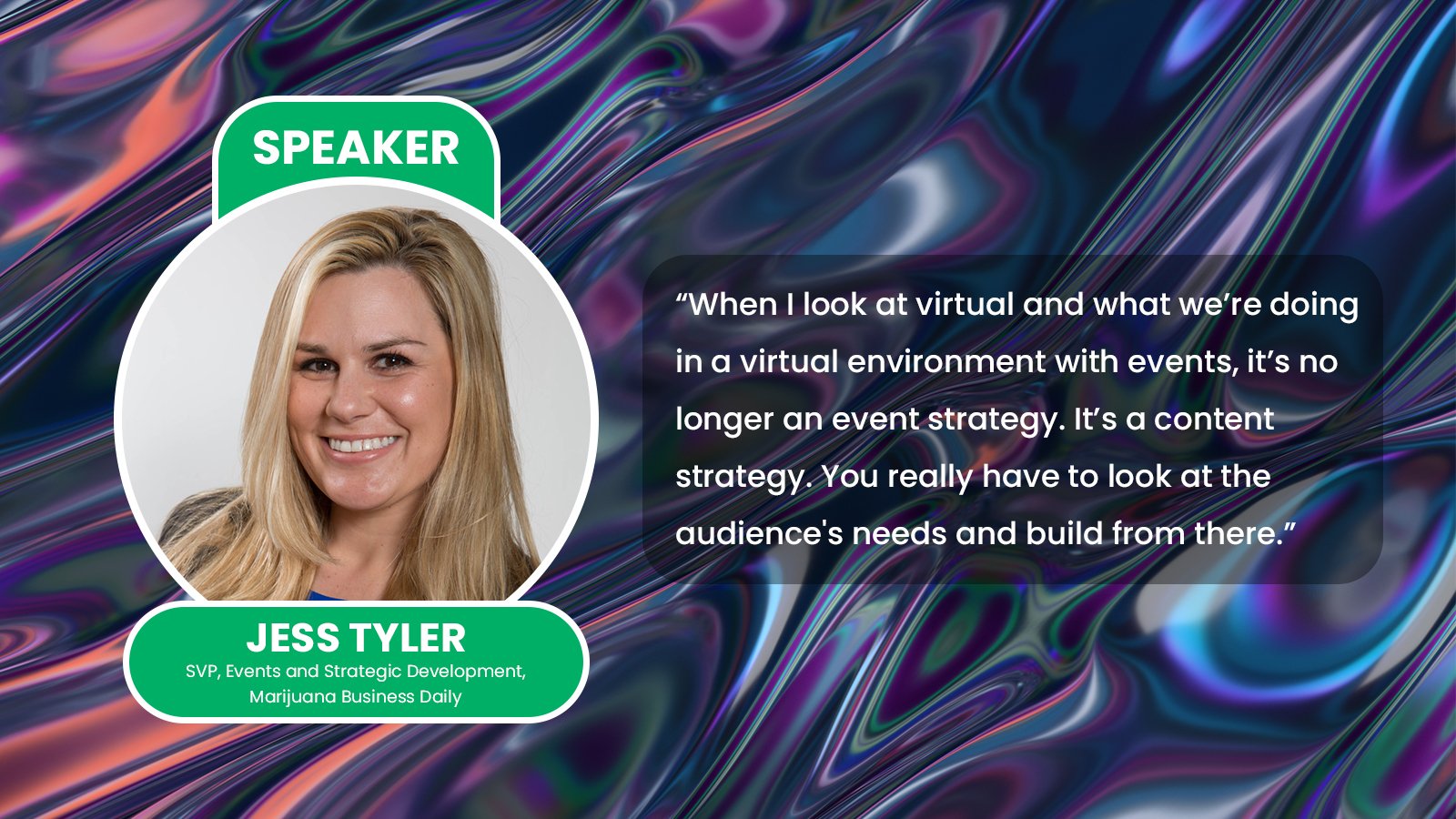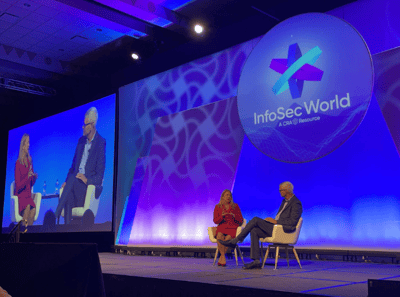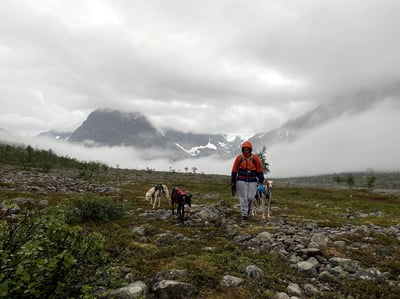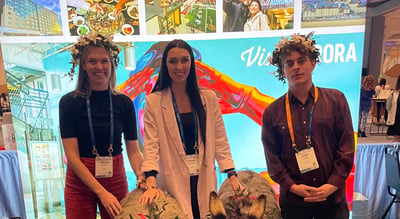Since the beginning of 2020 (and well before that), we've been determined to help the industry in any way we could.
Our mission at Brella is to empower people with access to meaningful connections and knowledge, because we accomplish everything in life with the help of others.
So, naturally, we decided to walk our walk and host our own event series for event professionals, Virtual Shake-Up. Our second edition of the event happened early December 2020, and it was a blast!
With some incredible speakers and viewers in attendance, we were thrilled to host such a powerful day, complete with industry-leading insights and hundreds of connections via our AI-powered matchmaking.
And we couldn’t have done it without the support of our amazing partners, who brough their years of expertise in livestreaming and event planning to ensure our event went off without a hitch:
If you missed Virtual Shake-Up 2.0, don’t worry. We collected the top takeaways here with incredible insights from speakers and attendees (plus all sessions on demand here).
These are mission-critical topics you need to be aware of as we start 2021.
In a rush? Here they are:
- To thrive, your business model and team skill sets must change
- Focus on the 24/7, 365 customer journey to build community
- Digital and in-person events are now hand-in-hand, for better or worse
- Your sponsors make the world go ‘round - but they need your help
Let's get into it!
To thrive, your business model and team skill sets must change
Is transforming your business model a priority? If so, you're in good company.
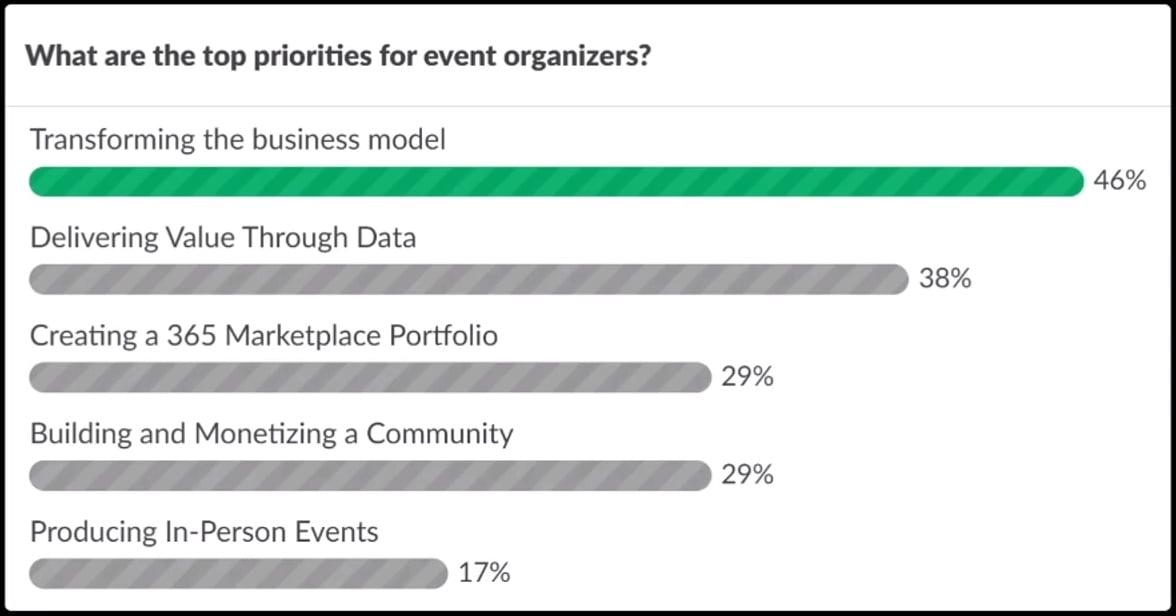
Porting the physical to the virtual won’t cut it anymore. Virtual environments require a different mindset and skillset, so to make the most of them, prioritize upskilling your team.
So which skills do you and your team need?
- Technology skills and platform knowledge. Understanding the platforms available for use (like venues, platforms are not one size fits all) and how to maximize your potential will be essential.
- Customer success skills. From onboarding sponsors and customers to your platform, to coaching on presentation skills, organizers who take a true hands-on approach to their customers will continue to win their business year after year.
- Marketing skills. You need to really understand what your audience wants, and be able to create agile personas based on this data.
- Sales skills. While sales teams are still selling access to a market, the format has changed. So those who can effectively sell virtual real estate will thrive.
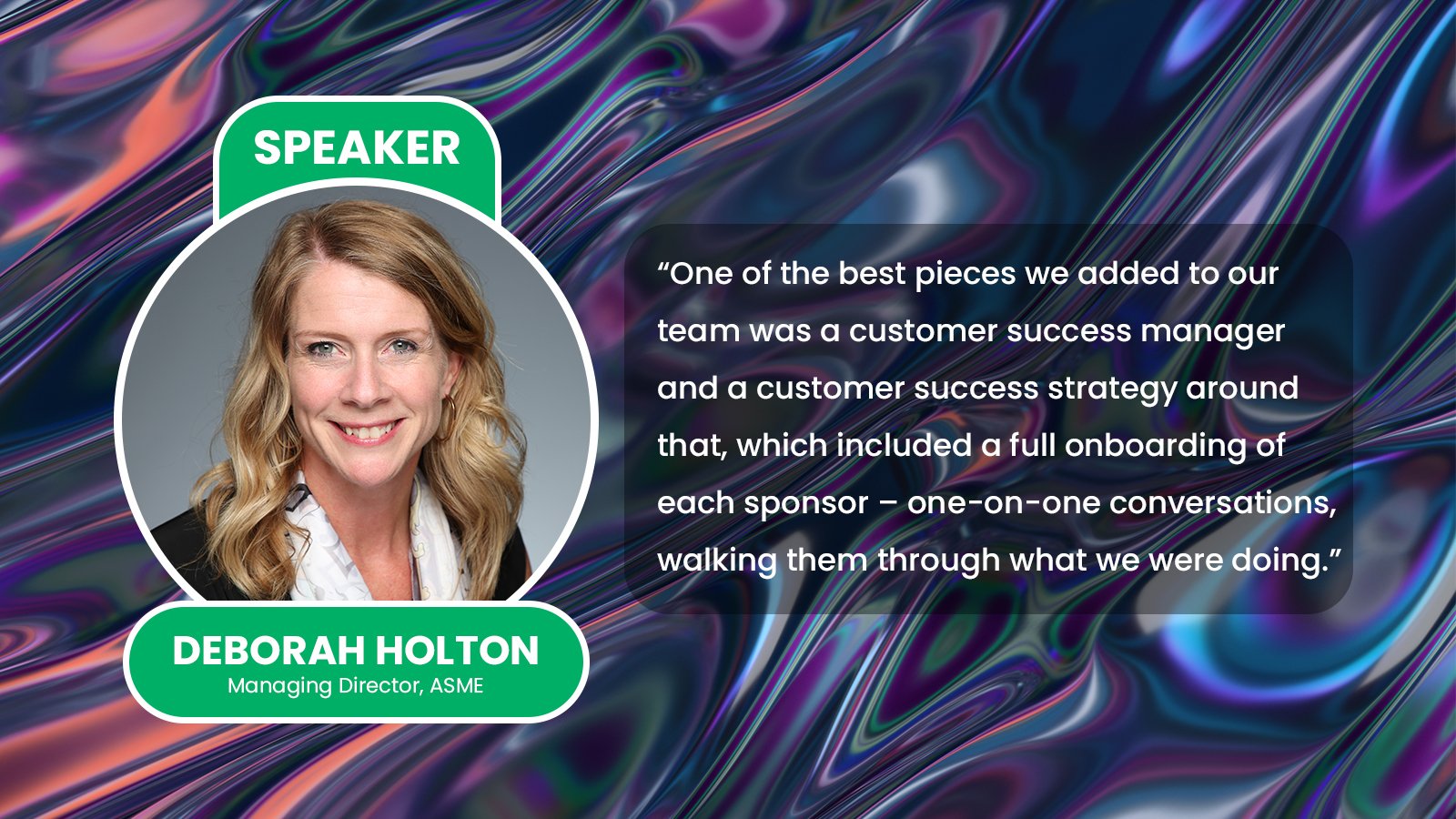
Onboarding your customers is key - and will continue to be vital as we pivot to hybrid. Watch the full session here.
“Back in Q4 2020 I did some research on what skills B2B event marketers would need in the future," says Aleksandra Panyukhina, B2B Event Marketing Strategist and attendee at VSU 2.0. "Although the core soft skills have remained the same, some of the updates in hard skills definitely call for event professionals to up their game:
- Even though the primary focus is on events, you are expected to be a full-fledged marketer at heart.
- Experience in content marketing, branding, or demand generation is not just a plus, it's an expectation.
- Event Marketers are expected to run not only events but also webinars and podcasts - the entire scope of digital initiatives!
- Experience running virtual events and understanding the technology landscape is necessary - unless you have some under your belt, landing an event marketing job will be harder.
- Expertise in the AV technology and ability to manage the technical side of broadcasting is a must, especially for individual contributor roles.”
But new skills are only half the battle. The old ways of doing things won't work anymore. You need a new mindset - you need to think like a startup and embrace experimentation.
"Experimentation will win out in 2021," says Peter Bordes, Managing Director of Global Events at CoinDesk (and attendee at VSU 2.0). "Those who continue to try to transfer the physical to virtual will lose; those who experiment, try new formats and adapt to the medium will succeed."
And no matter what sort of event you host and where, this is useful and actionable advice.
"Regardless of your industry, it’s not about getting your product perfect, but getting to market. More vendor partners need to listen to their clients, redevelop, refine, experiment and get things to market," says Bordes.
Finally, pivoting to a data-driven model will be essential. Making decisions based on facts and not gut feelings will give you an advantage over your competitors.
“Two things you need to focus on are database management and message quality," says Steve Corrick, CEO of Comexposium during his fireside chat. "Quite often, large organizations fall victim to the ‘message you until you register or unsubscribe’ mentality – and the messages are constantly reused or don’t excite the attendees like they used to."
So how can you excite your audience?
"Instead, consider the FOMO – what will the attendee get from their attendance? Why is it so important that they attend this event, to spend their valuable time engaging with your brand and content?
"That’s where skills in marketing, content and sales will take on a more important role. Understanding the core audience more clearly, creating content that suits those roles, and selling this new frontier effectively - that’s what the future of events is.”
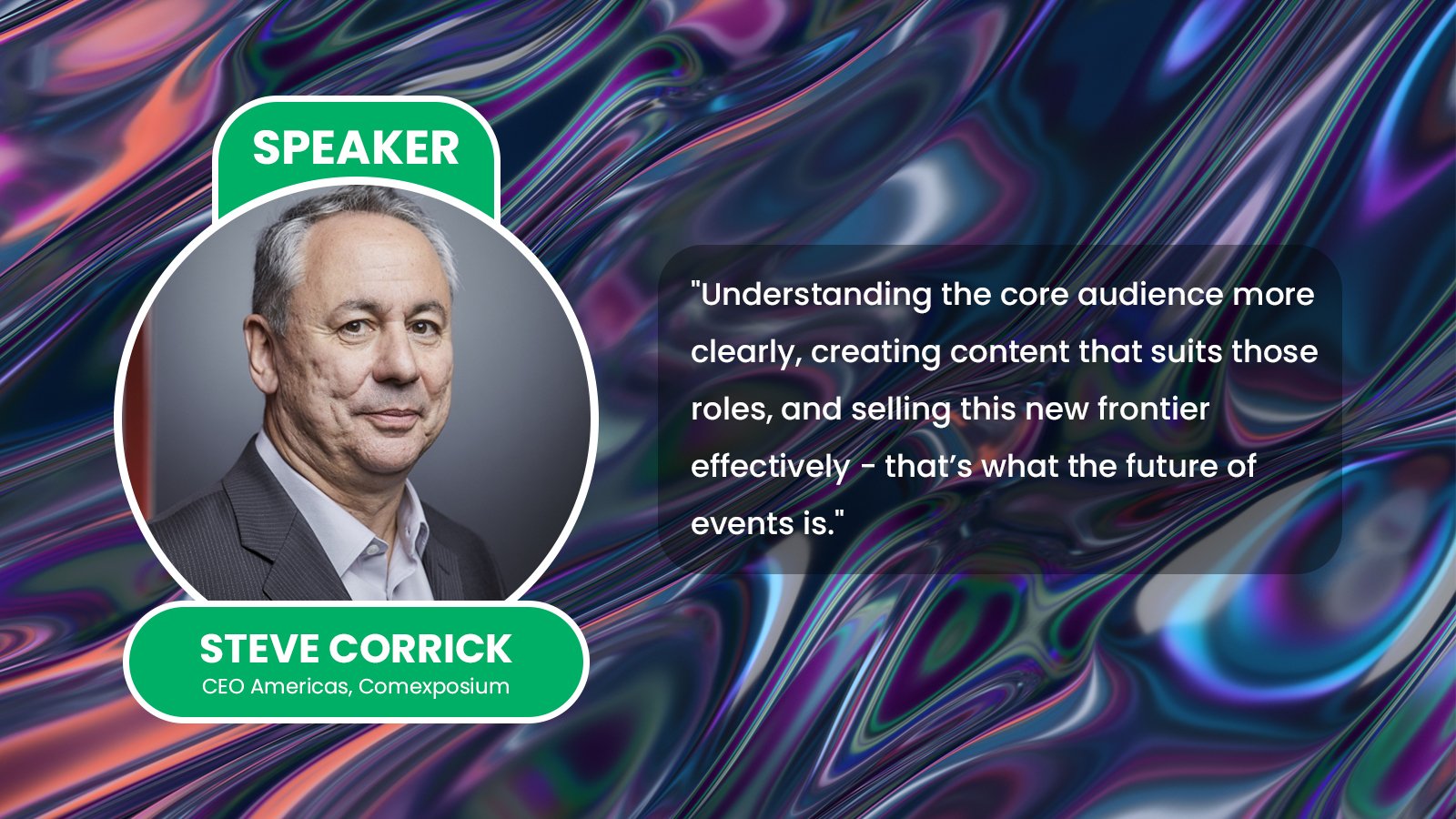
No event is immune from change, even large expositions. Watch Steve Corrick's take on the future of these large gatherings here.
Focus on the 24/7, 365 customer journey to build community
“Imagine that you are an exhibitor at a hybrid event and you are in discussions with a potential customer on the stand, and then you get a reminder that in 3 minutes you have a meeting with an online attendee," Stephan Forseilles, Head of Technology and Digital Transformation at Easyfairs says during his presentation at VSU 2.0.
"Isn’t it better to spread the online part throughout the rest of the year, and let the attendee have a hybrid journey throughout the whole year: being onsite when they can be onsite, and being online when they cannot be onsite? This is what I call a hybrid experience, where you can seamlessly go from online to face-to-face, and back and forth.”
While virtual and in-person are now entirely connected with one another, they can take many different forms.
Some hybrid events may look like two separate events - a physical and virtual event - combined into one. Others may take a different journey, allowing attendees to participate onsite when it suits them, and online when they cannot be onsite.
But no matter what you call it - community, 24/7, 365 communication - you need to get started now.
“Unless you had strong elements of community pre-covid, that’s going to take some time. You can’t just suddenly switch it on," says Corrick.
If you have integrated media, leveraging that can be a huge boon. Learn more about that in Jess Tyler's session.While your event may be the highlight of the year for your customers, you need to build and develop your community all year round.
Alla Skvortsova, Virtual Events Consultant and attendee at VSU 2.0, has some excellent advice for any organizer with dreams of building a strong community:
“Oftentimes, event organizers take a break between the events and forget about their attendees. No interaction, no place to continue the conversation. And then they struggle to sell tickets/bring back the attendees to the next event.
Giving your community members value in between your events turns them into loyal attendees. But beyond providing just tips and tricks, let them generate and share their own content, lead the conversation, point out technical imperfections, share their events, and new ideas.”
And it’s a challenge, even for the media companies. However, you always need to keep your customer and their journey in mind.
“For us as a media and events company, we can’t have these events in person, but there is still such a thirst and need for business opportunities, connections and education in the market," says Jess Tyler, SVP, Events and Strategic Development, Marijuana Business Daily, during her fireside chat.
"So we’ve had to rethink how we are doing things, and our core business model needed to be shifted, but at the same time, we’ve had to take that and make sure that we’re still meeting the needs of our audience, just in different ways.”
Digital and in-person events are now hand-in-hand, for better or worse
Even when face-to-face comes back (which it will), many places will not lift restrictions immediately. Plus, there will be those attendees who are more cautious about joining a large group, and more who are not willing to travel.
So while face-to-face will be the star, online will remain the ever-present sidekick.
But not every event needs the perfect blend of virtual and physical. Some events rely on face-to-face connections, while others will prefer the cost-effectiveness and broader reach of virtual.
However, there will always be some level of both on each. We crave the face-to-face, but after seeing what virtual is capable of, we would be foolish to give that up.
“The future is hybrid," says Matt Murnane, Director of Operations at LendIt Fintech. "People are used to getting the content they want, on demand, without leaving their home, viewing it on their phones, tablets. They want to have access to it and not be limited by their proximity to the physical event."
So what about meeting in person?
"There’s always a need to meet in person to facilitate organic face-to-face interactions. Best analogy – sports. You can watch them at home, at the bar, or at the stadium. When you consider it, hybrid events allow for two very different experiences, for two different types of attendees, which opens up opportunities for a wider audience.”
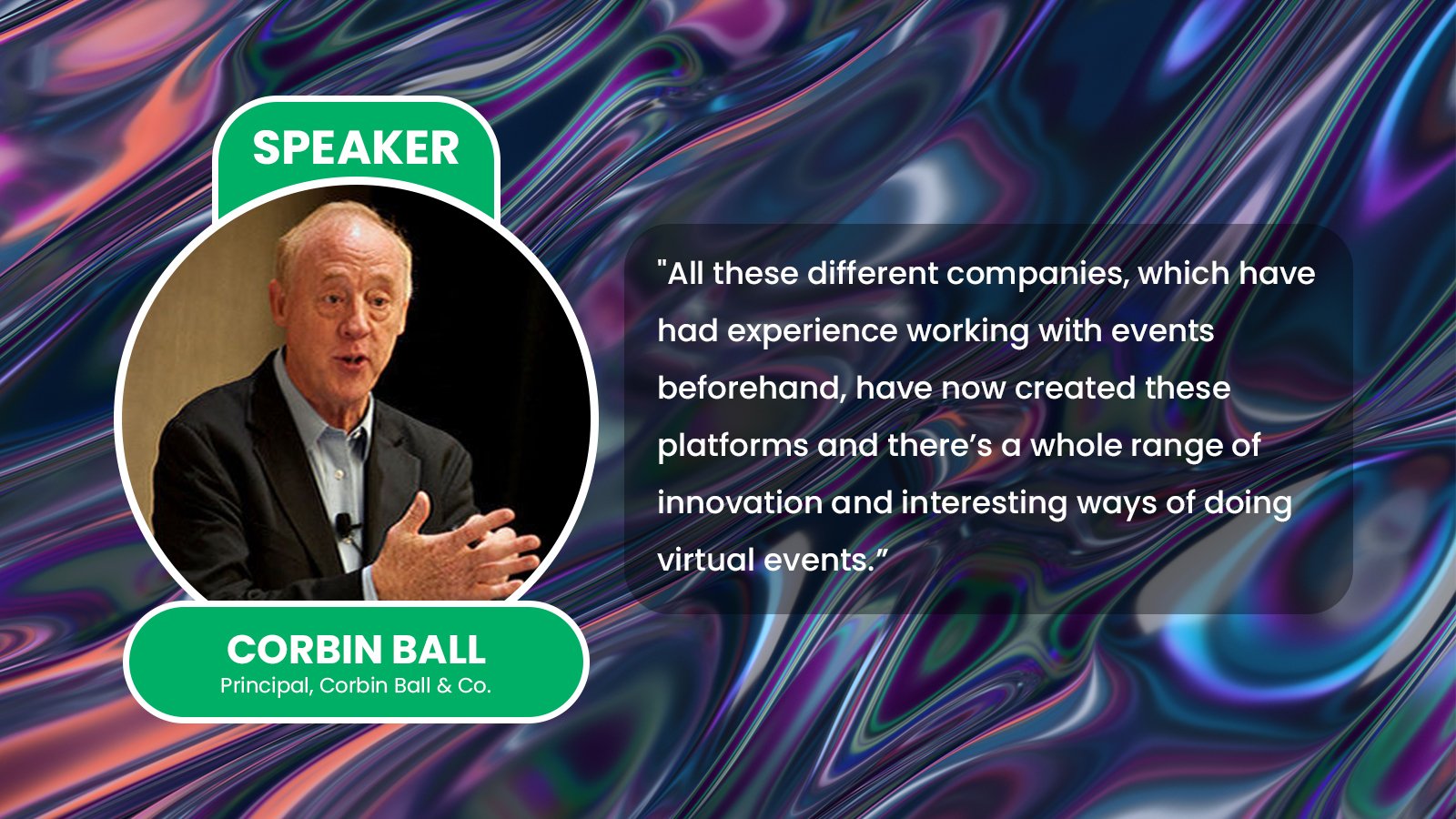
Corbin Ball has 23 years experience in the event tech industry, so don't miss his review on it's current state - and future.
And there are many great tools nowadays to ensure your event goes smoothly.
Corbin Ball has watched the event tech space for the past 23 years, and in his eyes, he has never seen "such an explosion of innovations".
"All these different companies, which have had experience working with events beforehand, have now created these platforms and there’s a whole range of innovation and interesting ways of doing virtual events," Ball says during his incredible presentation of the state of the industry.
However, remember the reason for your event - it’s the people, not the technology in use.
“Platforms are a really important decision, but I also encourage the teams not to end up in paralysis for weeks and weeks, debating which platform," says Corrick.
So what makes a good platform?
"The platform is like a football referee - best used when you hardly notice them," Corrick says. "In other words, they work perfectly. If you’re talking about the technology a lot, you aren’t talking about the core value that you bring to that community.”
Your sponsors make the world go ‘round - but they need your help
Here’s a question for you: Whose responsibility is it to provide sponsor ROI?
We asked that exact question to our audience, and here’s what they said.
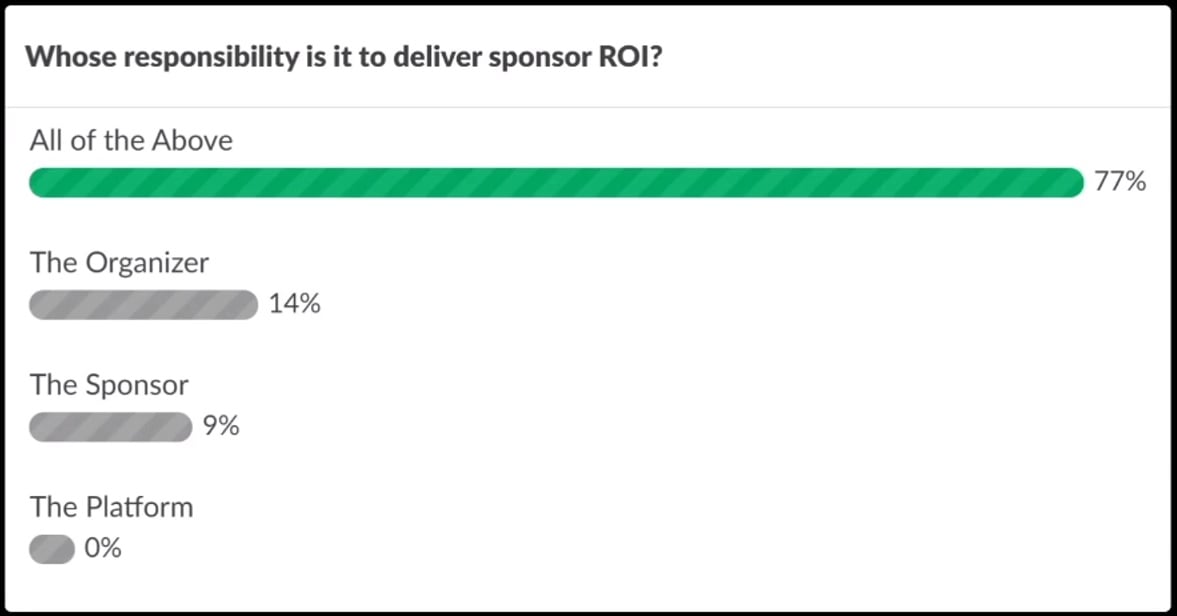
We fully agree that the best sponsor ROI (and ROI in general) occurs when everyone involved truly understands what is possible at virtual events.
By investing time and hosting workshops for your customers, you ensure their comfort with the platform and this new medium we are using. Because it’s new to them too!
So what did Christine Shaw, CEO of Investment News and her team do?
“We really spoke to our customers about the engagement in an online environment versus engagement in a physical environment. That helped them generate high quality leads," Shaw explains. "We would coach our sponsors and say, ‘These are the content assets you need, and these are the things you should be talking about to get attendees interested’. If you’re just putting a text message notification in a virtual booth, that’s not going to help.”
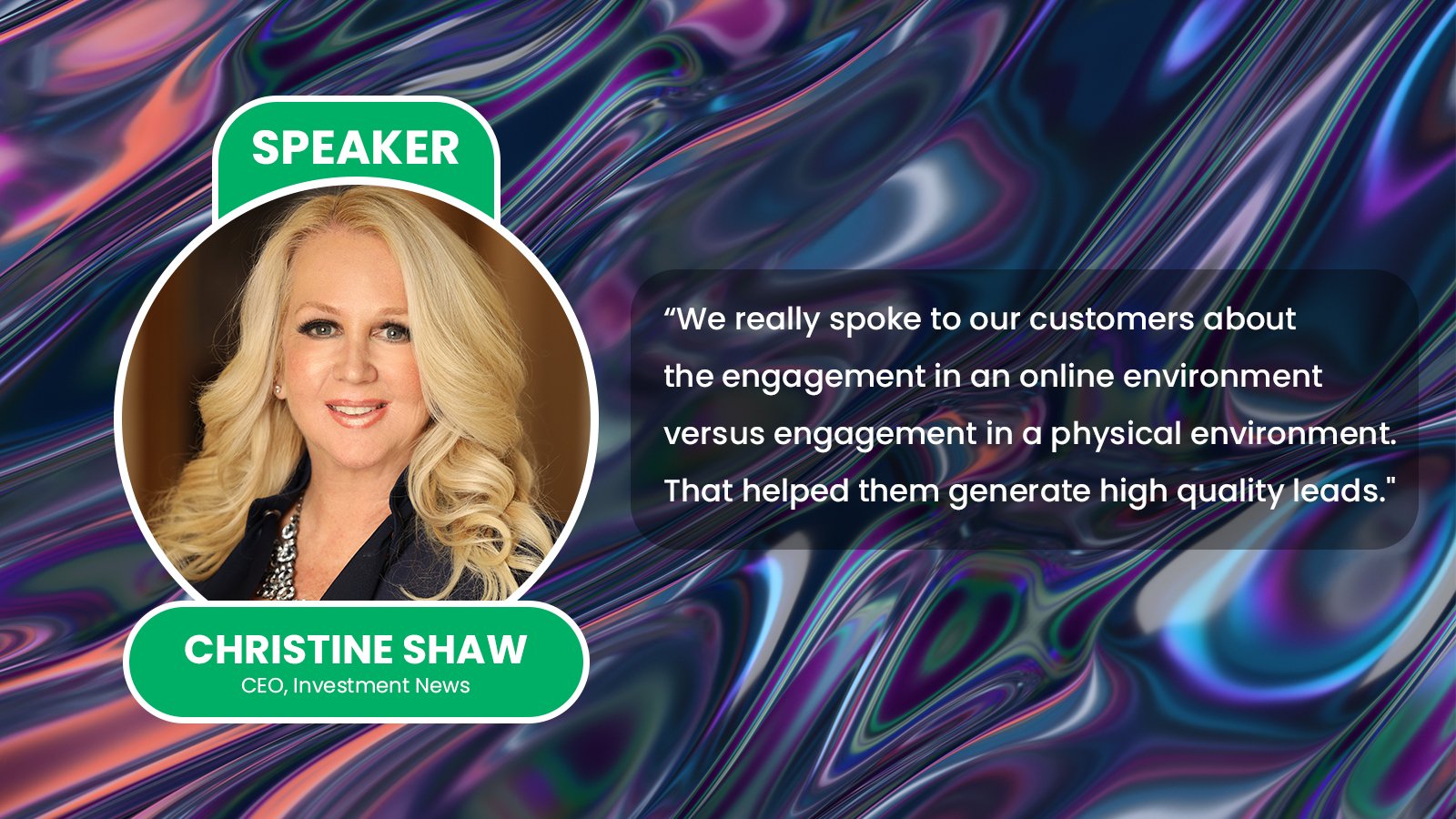
Investment News embraced virtual from the outset and succeeded. Watch Christine Shaw's session here.
When it comes to giving leads, make sure to check the lead relevance for your sponsors – then encourage them to use those leads! At the beginning, it may require hand-holding. A lot of hand-holding.
“We were at the point where we were setting up their virtual booth spaces, helping them fine-tune what they had available and giving them insight and advice, letting them know what works and what doesn’t work," says Deborah Holton, Managing Director of ASME Industry Events.
"All the way from their purchase decision, all the way until after the event, with detailed results and leads and analytics and going slide by slide with the sales rep through each different piece of their plan.”
And it is still possible to ask for the same amount of sponsorship for virtual as you did for in person events. Tying back to our previous point, you need to engage your audience differently, and leverage your knowledge of your sponsors' business to help them connect.
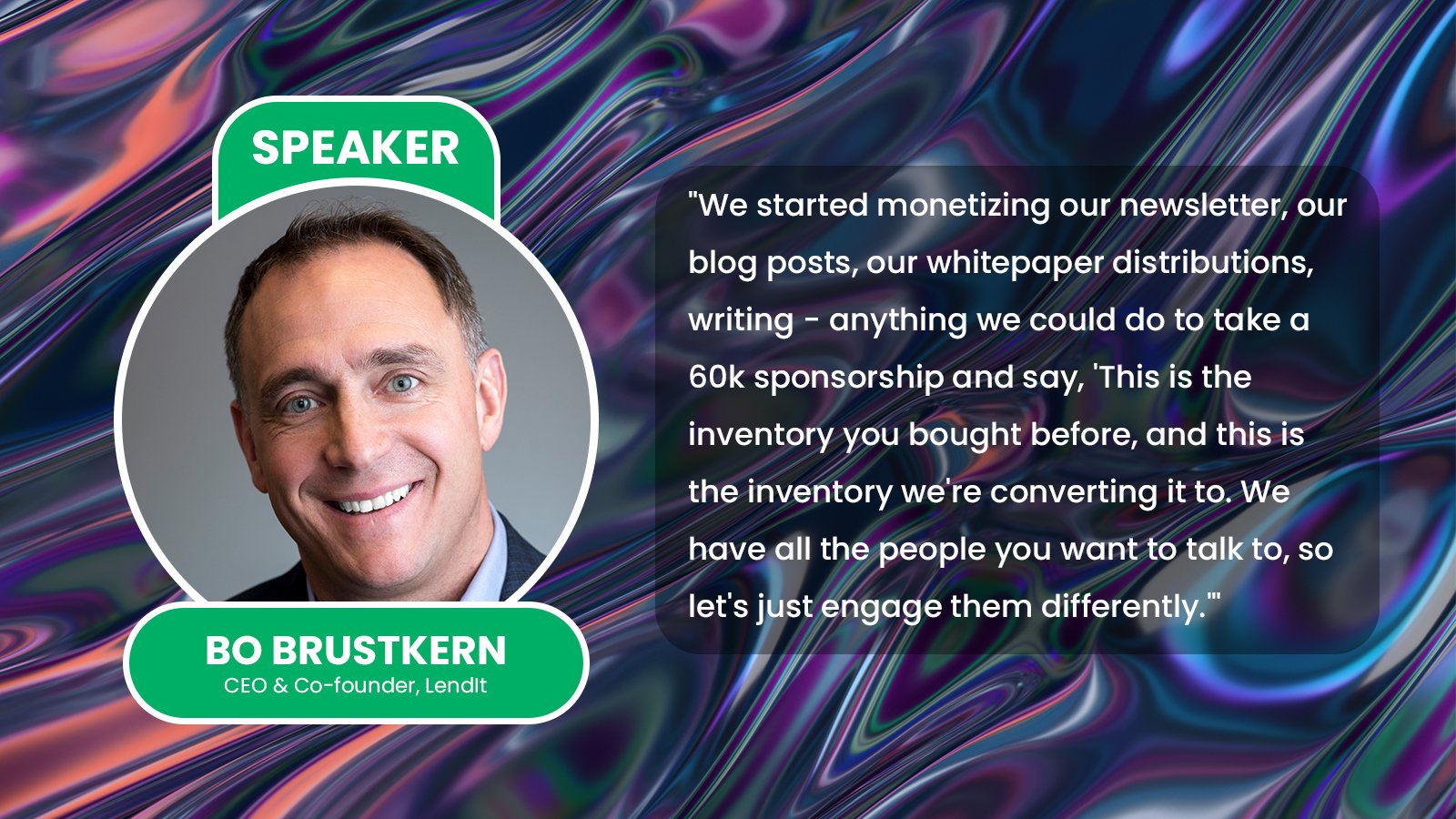
Watch how the largest fintech conference in the world successfully monetized their foray into virtual.
4 tips to get you started - but learning never stops!
There you have it - 4 essential tips for your events in 2021. Are you going to jump into hybrid the first chance you get, or will you stick with virtual?
If you want to further your virtual knowledge, take a look at our webinar series. Once a month, we’ll host a webinar on how to make the most of Brella and virtual events.
You can register for our webinars here, plus view all our previous webinars on demand.
Speaking of on demand, you can watch (or rewatch) all our incredible sessions on our YouTube channel.
And if you're interested in testing out a solid event platform for virtual and hybrid events,  and we'll contact you with a demo.
and we'll contact you with a demo.
Read more
- Virtual events
- Hybrid events
- In-person events
-
Event sponsorship
-
Aero Engines Americas 2024, Miami FL

-
Improve your conference sponsorship sales process with these 4 tactics

- 8 tips to drive more leads to your sponsors at your hybrid event
- How to book 635x more meetings with your event sponsorship
- Is your virtual event platform giving the best experience to your sponsors?
-
- Event engagement
- Event matchmaking
-
Brella news
-
Brella and Swoogo Partner for Optimized Event Experiences
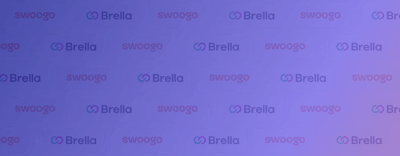
-
Brella wins the Best Event App in the US & Canada

- START Global partners with Brella for a world-class networking experience
- Brella co-hosts The European Startup Conference to help Ukrainian tech ecosystem
- Next Block Expo partners with Brella for a world-class networking experience
-
- Meet a Brellaneer


